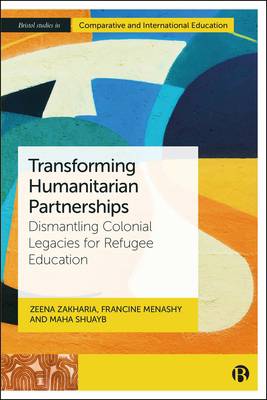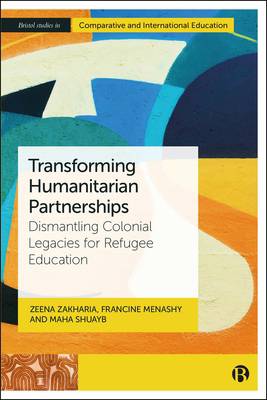
- Afhalen na 1 uur in een winkel met voorraad
- Gratis thuislevering in België vanaf € 30
- Ruim aanbod met 7 miljoen producten
- Afhalen na 1 uur in een winkel met voorraad
- Gratis thuislevering in België vanaf € 30
- Ruim aanbod met 7 miljoen producten
Transforming Humanitarian Partnerships
Dismantling Colonial Legacies for Refugee Education
Zeena Zakharia, Francine Menashy, Maha ShuaybOmschrijving
This book examines how global humanitarian systems shape partnerships in education in emergencies. Focusing on the Syrian refugee crisis and the education response in Lebanon, it reveals how colonial legacies, structural racism and the marketization of aid enable Global North actors to dictate policies and practices, while marginalizing local voices and knowledge. Yet in moments of crisis, community-led initiatives and smaller partnerships proved to be agile and responsive.
Rather than offering celebratory accounts of "partnership," the book draws on rigorous research to foreground the structural inequities that constrain them--while also pointing to possibilities for more just, community driven alternatives. A vital resource for scholars, practitioners and policy makers, it offers concrete pathways for reshaping humanitarian practice to support sustainable, responsive education for refugee learners.
Specificaties
Betrokkenen
- Auteur(s):
- Uitgeverij:
Inhoud
- Aantal bladzijden:
- 192
- Taal:
- Engels
- Reeks:
Eigenschappen
- Productcode (EAN):
- 9781529239010
- Verschijningsdatum:
- 1/07/2026
- Uitvoering:
- Paperback
- Formaat:
- Trade paperback (VS)
- Afmetingen:
- 156 mm x 234 mm

Alleen bij Standaard Boekhandel
Beoordelingen
We publiceren alleen reviews die voldoen aan de voorwaarden voor reviews. Bekijk onze voorwaarden voor reviews.







